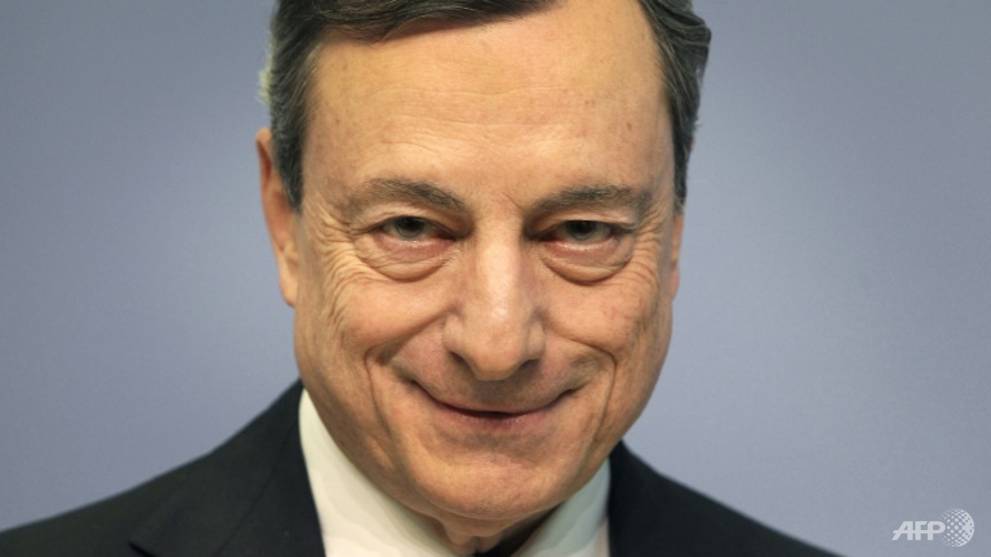
Medal for former ECB chief Draghi divides Germans
FRANKFURT AM MAIN: Months after the end of his term as president of the European Central Bank, Italian economist Mario Draghi will receive Germany's highest honour Friday (Jan 31), drawing attacks from critics of his easy-money policy.
How can a man who "deprived millions of German savers of their interest payments" be awarded the Order of Merit, demanded tabloid-style daily Bild.
When Draghi lowered rates last September, Bild dubbed him "Count Draghila sucking our accounts dry", altering a photo to show him with fangs and a cape.
German President Frank-Walter Steinmeier will present the Italian economist with the badge in a ceremony at Berlin's Bellevue Palace at noon (1100 GMT).
A YouGov poll commissioned by business daily Handelsblatt found 60 per cent of respondents did not agree Draghi should be honoured for "services to the international financial system" and the euro single currency.
"His monetary policy may have benefited some countries in southern Europe. But it did not benefit the eurozone and certainly not Germany," conservative MP Axel Fischer told Bild.
Beatrix von Storch, vice-president of the far-right AfD party, called the medal for Draghi "a shame".
But the chorus of criticism has never been unanimous.
When Draghi departed in October after eight years at the helm of the ECB, DIW think tank economist Marcel Fratzscher dubbed him a "great European" whose policy "prevented an economic depression and the break-up of the euro".
"Germany's excellent economic situation today has been possible not despite, but also because" of Draghi, he added.
SAVERS' GRUMBLES
Nevertheless, many German economists and politicians still smart from ECB policy under Draghi's leadership.
The Frankfurt institution has so far bought more than 2.6 trillion euros (US$2.9 trillion) of bonds in a "quantitative easing" (QE) asset purchase scheme and set interest rates to historic lows.
The measures are designed to boost the supply of credit in the eurozone economy, stimulating growth and pushing inflation towards the ECB's target of just below two percent.
But in Germany, where many prefer to save for retirement rather than buy a home, the knock-on effects of slashing risk-free interest income on savings accounts were felt especially painfully.
While finance minister, Wolfgang Schaeuble blamed Draghi's policy in part for the rise of AfD, although he declined to comment on Friday's award when contacted by AFP.
On his side, Draghi did little to endear himself to the ECB's host country.
The 72-year-old did not learn German during his time in Frankfurt - unlike new chief Christine Lagarde, who said she took up study of the language immediately.
Lagarde also endeared herself with locals by making a high-profile appearance at the city's new year's festivities this month, something Draghi never did.
STORMY SEAS
In one memorable remark addressed to Germans, Draghi in a 2013 interview with Der Spiegel magazine decried their "perverse fear" that things would go badly in the eurozone.
Later, speaking to Die Zeit, he insisted that ECB policy must be made for all 19 member countries and use all available tools, including QE and negative rates.
In the public debate about his medal, the ecologist Greens party has been Draghi's most vocal supporter.
MP Sven-Christian Kindler accused conservative lawmakers of "hypocrisy" over their criticisms.
Germany would never have been able to achieve a balanced federal budget without the low interest rates on its debt brought about by ECB policy, Kindler said.
Even Hans-Werner Sinn, the former president of the Ifo economic institute who regularly attacked Draghi's policy during his tenure, "congratulated" the Italian and hailed his "expert" knowledge of financial markets, the Frankfurter Allgemeine daily reported.
"You managed to steer the euro through a stormy sea," Chancellor Angela Merkel told Draghi at his ECB leaving ceremony.
Outside Germany, Draghi remains widely credited with saving the euro, notably with his 2012 promise to do "whatever it takes" to preserve the single currency at the height of its sovereign debt crisis.